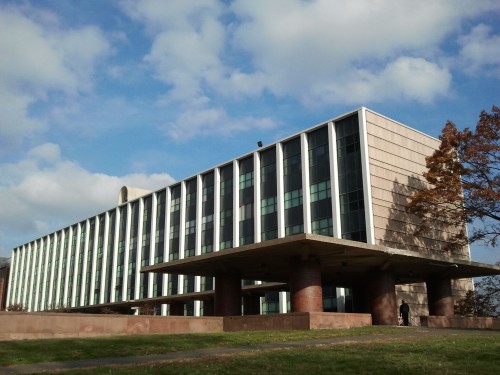
Three members of the Yale Society of Physics Students, Po-Yi Ho BR ’14, Steven Zwick PC ’14, and Robert Davies DC ’13, offer the following pieces of advice (in no particular order of significance) for students at Yale interested in majoring in Physics:
1. First, make sure you read the textbook — it might be more useful than going to class.
2. Differential equations and linear algebra are both very useful. But despite what the Yale Bluebook says, taking Math 230 (Vector Calculus and Linear Algebra I) is not necessary to take concurrently with Physics 260 (Intensive Introductory Physics). See next point for further explanation.
3. A lot of math is covered in the physics classes themselves. Physics professors will assume that you know multivariable calculus and linear algebra, but otherwise, they will teach you the math you need to know.
4. You can start taking graduate level courses as a junior or senior; for example, there is a graduate class on general relatively if you are inclined to study that subject in your junior year.
5. You should probably take quantum mechanics before you take statistical mechanics. Make sure you take PHYS 420 (Statistical Mechanics) when you do not have a lot of other things going on. It is the hardest class in the major.

6. We have a lot of great professors here. Make sure you talk to professors a lot.
7. Always do independent research. Research is not a requirement, but if you want to go to a good graduate school, do as much research as you can. You will learn lots of things that are not covered in classes, and you will get experience making posters and giving talks.
8. For research during your freshman and sophomore summer, go somewhere other than Yale. Then, for your junior summer, stay here and get to know a professor.
9. Make sure you talk to graduate students; they are generally very friendly.
10. Do not start your senior project during fall of your senior year. Do it in the summer of your junior year. 40 hours a week feels like nothing during the summer, but 10 ten hours a week is a huge burden during the school year.

11. For your senior research, building a relationship with your professor is critical. You want to show them you’re working in their lab because you want to, not because you need to get your project done at the last minute.
12. If you want to go to graduate school, three things matter. The first is your GRE, which is just making sure you know enough physics. Second is your personal statement, and third are your recommendations. Peter Parker, the Director of Undergraduate Studies in Physics, gives good advice about applying to graduate school.
13. Make friends with people in your physics classes — they are also really cool. Work on problems on your own, and then meet with a study group. It is good to have a study group.
14. If you are not sure what you are interested in as a freshman, come to lots of talks, try working in different labs, and read lots of different articles.
15. Most importantly, take it easy. It’s fun. Don’t worry too much.
